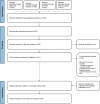Healthcare professionals' perspectives on and experiences with non-invasive prenatal testing: a systematic review
- PMID: 40205233
- PMCID: PMC12003526
- DOI: 10.1007/s00439-025-02736-y
Healthcare professionals' perspectives on and experiences with non-invasive prenatal testing: a systematic review
Abstract
Background: The increasing integration of non-invasive prenatal testing (NIPT) into antenatal practice and public healthcare systems globally raises both significant challenges in standardising service delivery and important ethical questions around routinisation and reproductive autonomy. This systematic review aims to synthesise existing primary empirical research on healthcare professionals' views on and experiences with NIPT.
Methods: A systematic search was conducted across four major databases in September 2023 and repeated in December 2024. Studies that reported findings from primary empirical research, including quantitative, qualitative and mixed methods research were included.
Results: Searches returned 65 eligible articles, spanning 38 countries and 1 special administrative region and at least 12 professions. Views on who NIPT should have access to and which conditions should be screened for were influenced by perceived clinical utility. While healthcare professionals acknowledged NIPT as beneficial for supporting reproductive autonomy, concerns were raised about the amount and complexity of information to be conveyed during prenatal counseling and potential pressure to test. Cost was also identified as a significant barrier. Challenges reported during post-test counseling included communicating test failures and gaining information from laboratories. Views on the implications of NIPT for decision-making around abortion and for people with disabilities varied.
Conclusions: Healthcare professionals play a critical role in facilitating the access to and decisions by pregnant people around prenatal genetic testing. Addressing barriers in clinical practice and increasing consistency across and access to clinical guidelines and education resources may support healthcare professionals in supporting reproductive autonomy.
© 2025. Crown.
Conflict of interest statement
Declarations. Conflict of interests: The authors have not disclosed any competing interests
References
-
- American College of Obstetricians and Gynecologists (2024). NIPT Summary of Recommendations. Current ACOG Guidance. https://www.acog.org/advocacy/policy-priorities/non-invasive-prenatal-te...
-
- Royal Australian and New Zealand College of Obstetricians and Gynaecologists (2024, October). Screening and diagnosis of fetal structural anomalies and chromosome conditions (C-obs 35): Clinical Guideline. https://ranzcog.edu.au/wp-content/uploads/Fetal-Anomalies-Clinical-Guide...
Publication types
MeSH terms
LinkOut - more resources
Full Text Sources
Medical


